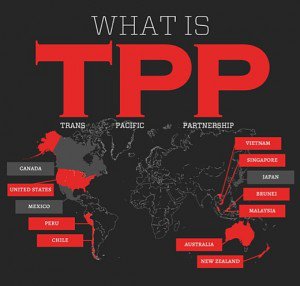05/11/2015

James Kirkpatrick’s expose of the GOP Establishment’s suicidal rush to support the Obama Administration’s fast-tracking the Trans-Pacific Partnership “free trade” agreement, thus ceding the working class vote to the Democrats who mostly oppose TPP, stirs a couple of memories.
First: interviewing Milton Friedman over twenty years ago. Friedman, like all classical liberal economists, believed in free trade…in principle. But, speaking of NAFTA, he said:
The capital-rich countries are going in a protectionist direction, building walls around their blocs. Fortress Europe. The U.S. with Canada and Mexico.And of course “unilateral, multilateral free trade” is the logical classical liberal position. Classical liberal economists are required by their principles to be suspicious of all so-called free trade negotiations. What’s to negotiate? It can only be favor-trading between politically-connected interest groups — what Friedman called “managed trade.”Don’t misunderstand me. I’m not opposed to the U.S.-Mexico-Canada Free Trade Agreement. But I think what’s called bloc free trade is often managed trade. I would prefer unilateral, multilateral free trade.
(Emphases added).
I discussed these issues in more detail in my review (in the American Spectator!) of Patrick J. Buchanan’s 1998 trade book. I still think Pat was wrong to emphasize trade over immigration in his tragic John-the Baptist-style political career. But the fact is that the benefits of free trade claimed even by its supporters are surprisingly small, and its costs, in terms of its redistribution of income within First-World countries, surprisingly large.
The second memory: it dates back even further, to 1990 or 1991 when NAFTA was being negotiated by the Bush I Administration. (NAFTA was negotiated by the Bush Administration and passed by the Clinton Administration — another example of the top-level bipartisanship that trade deals mysteriously seem to attract).
I was having dinner in Manhattan with an economist aide to British Prime Minister Margaret Thatcher, who had just come up from meetings in the White House.
He expressed astonishment that Bush aides had casually told him they had informally promised the Mexicans that the U.S. would tolerate increased illegal immigration to accommodate the Mexican farm laborers who would be thrown off the land if Mexico gave up its corn price supports, which U.S. agribusiness demanded. (See “politically-connected interest groups” above. Again, from the point of view of classical theory, Mexico’s internal policies should have been no concern of the U.S, since the Mexicans were only penalizing themselves).
Of course, this was diametrically opposed to what credulous GOP voters were being told by the Wall Street Journal Editorial page etc.: that free trade would reduce illegal immigration, because it would boost Mexico’s economy.
Now the Republican Establishment claims that there will be no immigration provisions in TPP; America’s Senator, Jeff Sessions, has refuted this.
But my experience suggests that an even graver danger is the informal promises that our rulers make. After all, Obama has shown us, and the GOP Congressional Leadership apparently accepts, that law is whatever the Chief Executive/ King says.
Isn’t that what the American Revolution was all about?
In a better-governed age, America had the Dillingham Commission to investigate the impact of immigration before legislating the 1924 cut-off.
But that just means that the Historic American Nation will now have to conduct treason trials to find out who was responsible for its post-1965 Immigration Disaster.
Those Bush aides (Karl Rove?) will be in the dock alongside malefactors like exhumed JFK/ LBJ aide, and 1965 Immigration Act architect, Norbert Schlei.
Peter Brimelow is the editor of VDARE.com. His best-selling book, Alien Nation: Common Sense About America’s Immigration Disaster, is now available in Kindle format.
This is a content archive of VDARE.com, which Letitia James forced off of the Internet using lawfare.